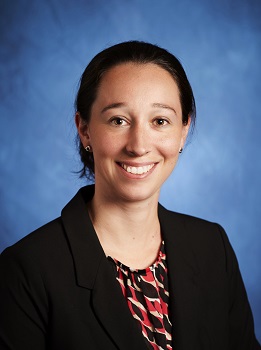The Evolving Role of Legal Counsel in Education: An Interview with Associate Professor Maria Lewis
The Evolving Role of Legal Counsel in Education: An Interview with Associate Professor Maria Lewis
By Stephanie Koons

In today’s rapidly shifting sociopolitical and sociolegal climate, legal counsel for educational institutions have become more critical than ever. Attorneys advising PK-12 schools and universities play a significant part in shaping policies that can either support or hinder equity. To gain deeper insights into this complex intersection of law, education and policy, we spoke with Maria Lewis, associate professor in education policy studies and an affiliate faculty member with Penn State Dickinson Law. She is a leading scholar whose research focuses on the legal dynamics influencing educational institutions.
The Intersection of Law and Education
Lewis’s interest in the legal aspects of education policy stems from her childhood and her background and training in both law and education.
“My commitment to justice was fostered during childhood,” Lewis continued. “My mom led her life with unshakable character and integrity; she instilled and reinforced the values of fairness and justice as a part of our everyday lives.
“Building on this foundation, I’ve always been interested in interdisciplinary scholarship situated at the intersection of education, law and policy, particularly as it related to equity and civil rights,” she explained. “Education is a fundamental institution in society, and court decisions or legislation can either dismantle or exacerbate systemic inequities.”
The role of attorneys in K-12 and higher education has evolved significantly, Lewis said, yet there is surprisingly little recent scholarship on their influence.
“Most research on legal counsel’s role in education was conducted in the 1990s and early 2000s,” she noted. “But given today’s sociopolitical climate, it’s more important than ever to understand how attorneys shape educational policies and responses, particularly in matters of civil rights.”
Challenging Repressive Legalism: The Critical Legal Leadership Academy
One of Lewis’s key initiatives is the Critical Legal Leadership Academy (CLLA), which seeks to address the restrictive legal environment that many educational institutions face. The inaugural program, co-directed by Lewis and Penn State Education Policy Studies alumna Raquel Muñiz, associate professor of law and education at Boston College, was held in February.
“The goal of the academy was to get people thinking about what it means to push back against an environment of what Dr. Liliana Garces and colleagues refer to as repressive legalism,” Lewis said. “In the current climate, many institutions are adopting unnecessarily restrictive policies and practices out of fear of litigation or political backlash. We wanted to bring together legal counsel, compliance professionals and educational leaders to explore ways to act within the bounds of the law while retaining commitments to diversity, equity, and inclusion (DEI).”
By fostering collaboration between school administrators and legal counsel, the CLLA encourages interdisciplinary conversations that ensure institutional policies reflect core educational and institutional values.
To ensure that legal counsel supports rather than hinders equity in education, Lewis advocates for proactive dialogue between attorneys and educational leaders.
“It’s crucial for institutions to have mission-driven conversations with their legal teams,” she emphasized. “Rather than reacting to crises, they should proactively establish a shared understanding of the institution’s values and how they inform decision-making within legal boundaries.”
“Attorneys and educational leaders are often socialized differently in their professional training,” Lewis observed. “CLLA creates a space where they can develop a shared language and strategic approaches to maintaining institutional missions in the face of legal and political pressures.”
Lewis co-authored a related article for practitioners that provides some additional recommendations for collaboration between attorneys and educational leaders.
Navigating the Legal and Political Landscape
As the legal landscape shifts, several pressing issues demand attention. Lewis highlights a few key areas:
- Federal Civil Rights Enforcement: “Under the current administration, the role of the U.S. Department of Education in civil rights enforcement is evolving, and we’re seeing significant developments that could reshape legal protections. We are also seeing challenges to longstanding civil rights laws, including Section 504 of the Rehabilitation Act and the rights of students with disabilities.”
- Anti-DEI Policies: “Following the Supreme Court’s most recent decision on race-conscious admissions, some institutions are interpreting the ruling more restrictively than required, including reconsidering DEI strategies broadly, despite the ruling’s narrow focus on admissions.”
- First Amendment Issues: “Questions around free speech in education and its connections to DEI—whether it’s about student protests, faculty speech or institutional statements—are becoming more prevalent.”
In response to these pressures, it is important for school districts and universities to analyze their approach to hiring legal counsel. Lewis conducted a related study recently.
“We engaged in a content analysis (in a soon-to-be-published study) of job descriptions for school district legal counsel, both in-house and positions through law firms, from January to April 2024. We sought to better understand the skills, knowledge, and experience that educational institutions are seeking,” Lewis shared. “While many postings emphasized general legal expertise, few highlighted the need for strategic thinking in the current sociopolitical climate. There’s a growing need for attorneys who understand how to align legal decisions with institutional missions.”
Looking Ahead: Future Research and Policy Implications
Lewis’s research is far from finished.
“Much of what happens in schools is dictated by legal frameworks that are often invisible,” she explained. “By conducting research that includes legal counsel as key institutional actors, we can better understand how educational policies evolve and what opportunities exist to advance equity.” Lewis’s scholarship encourages other researchers to include attorneys in their research as well.
“I’m interested in continuing to explore the role of legal counsel through multiple entry points — whether through studying their role in shaping policies, analyzing repressive legalism or examining institutional approaches to changes in civil rights enforcement at the federal level,” she said. “With shifting federal policies and numerous issues for courts to resolve, universities and school districts are constantly trying to interpret their legal obligations. Attorneys play a significant role in helping institutions navigate this evolving landscape.”
In an era of increasing legal scrutiny and political shifts, Lewis’s work underscores the need for educational institutions to critically assess how legal counsel influences their ability to uphold diversity, equity and inclusion.
“The law dictates what we ‘may’ or ‘must’ do,” she concluded, “but within those boundaries, there’s always the question of ‘should we?’ That’s where institutional values truly come to life.”
____________________________________________________________________________

